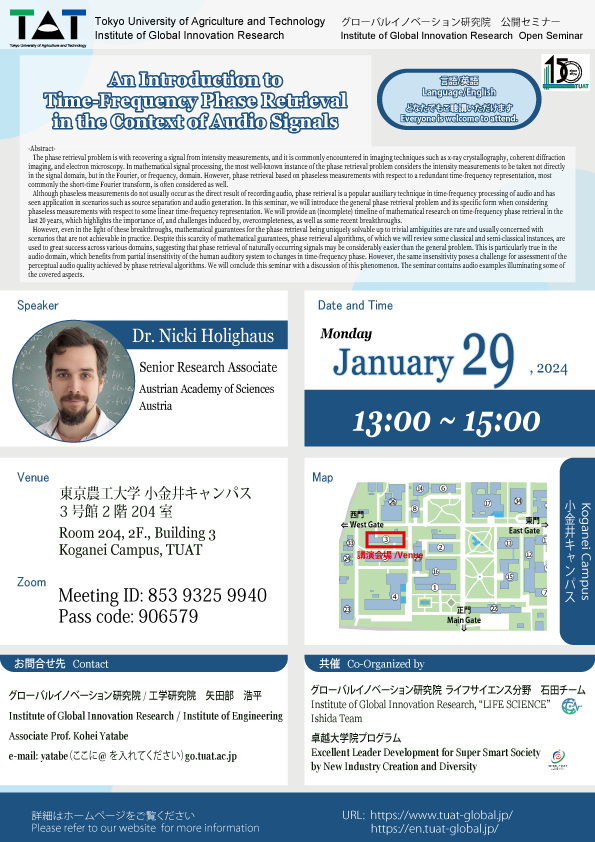Event
【GIR Open Seminar】Dr. Nicki Holighaus / Austrian Academy of Sciences(Austria)

| Date | 2024.1.29 (13:00 - 15:00) |
|---|---|
| Venue |
Room 204, 2F, Building 3, Koganei Campus, TUAT Meeting ID:853 9325 9940 Passcode:906579 |
| Google Classroom Code | o4k6ts6 |
| Speaker | Dr. Nicki Holighaus |
| Affiliation | Austrian Academy of Sciences (Austria) |
| Title | "An Introduction to Time-Frequency Phase Retrieval in the Context of Audio Signals" <Abstract> The phase retrieval problem is with recovering a signal from intensity measurements, and it is commonly encountered in imaging techniques such as x-ray crystallography, coherent diffraction imaging, and electron microscopy. In mathematical signal processing, the most well-known instance of the phase retrieval problem considers the intensity measurements to be taken not directly in the signal domain, but in the Fourier, or frequency, domain. However, phase retrieval based on phaseless measurements with respect to a redundant time-frequency representation, most commonly the short-time Fourier transform, is often considered as well. Although phaseless measurements do not usually occur as the direct result of recording audio, phase retrieval is a popular auxiliary technique in time-frequency processing of audio and has seen application in scenarios such as source separation and audio generation. In this seminar, we will introduce the general phase retrieval problem and its specific form when considering phaseless measurements with respect to some linear time-frequency representation. We will provide an (incomplete) timeline of mathematical research on time-frequency phase retrieval in the last 20 years, which highlights the importance of, and challenges induced by, overcompleteness, as well as some recent breakthroughs. However, even in the light of these breakthroughs, mathematical guarantees for the phase retrieval being uniquely solvable up to trivial ambiguities are rare and usually concerned with scenarios that are not achievable in practice. Despite this scarcity of mathematical guarantees, phase retrieval algorithms, of which we will review some classical and semi-classical instances, are used to great success across various domains, suggesting that phase retrieval of naturally occurring signals may be considerably easier than the general problem. This is particularly true in the audio domain, which benefits from partial insensitivity of the human auditory system to changes in time-frequency phase. However, the same insensitivity poses a challenge for assessment of the perceptual audio quality achieved by phase retrieval algorithms. We will conclude this seminar with a discussion of this phenomenon. The seminar contains audio examples illuminating some of the covered aspects. |
| Language | English |
| Co-Organized by | Institute of Global Innovation Research "LIFE SCIENCE" Ishida Team Excellent Leader Development for Super Smart Society by New Industry Creation and Diversity |
| Contact | Institute of Global Innovation Research, Institute of Engineering Associate Prof. Kohei Yatabe e-mail: yatabe(at)go.tuat.ac.jp |
| Remarks | This seminar will be held both face-to-face and online concurrently. |
このページの上部へ